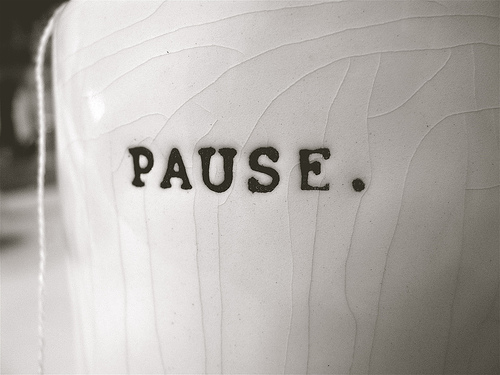How many times have we all slid down the slippery slope of doing or saying something we later regret? How many times have we felt ourselves about to lose our temper, but can't quite get a grip and end up giving someone a piece of our minds, perhaps quite literally?
I think when we lose our tempers, we lose access to our rational higher thinking minds, the part of our mind that lets us maintain clarity so we can respond skillfully and effectively. The trick is to know when we're about to lose it and have the discipline to stop before we cause unnecessary trouble or heartache.
Or perhaps it’s not as treacherous as sliding down a slippery slope and landing in some slimy muck. It may be less dramatic than that. Many of us know the common experience of being with someone who is in a lot of emotional pain and we have the strong inclination to offer unsolicited advice that we think will fix, change or solve the problem and relieve their suffering. It’s likely our own discomfort with their suffering that we can’t tolerate. Our advice is often not needed or desired. What’s needed most is to listen, to stay quiet, and to just be there. I remember a few years ago talking with my mentor, Donald Rothberg, about the challenges and discipline of staying steady in a difficult conversation with someone I love; not taking their emotions personally and being willing to tolerate their pain and my discomfort. What Donald said has since profoundly changed my capacity to be with difficult conversations in general. He said "Tune into her pain and you'll be in your right mind." Brilliant! More than just about anything, I want to be in my right mind. Tuning into someone else’s pain and staying put is a magnificent expression of generosity, loving-kindness, compassion and equanimity. As much as we may love someone and want them to be well, we really cannot change another person. But we can change ourselves. And by changing ourselves, we change our actions, our interactions, and the conditions of our lives. Here are some tools and practices for developing the capacity to pause, tune in and stay in our right minds. WAIT, WAIT…STOP! WAIT and ask yourself:What am I thinking?
Why am I talking?
These two questions will give you the time and space to re-examine your motivations and intentions, to gain some clarity. Next, literally STOP:Stop
Take a breath, Tune in to what’s happening inside and outside of yourself
Observe and re-Orient
Proceed with Purpose, either by pausing a little longer or carrying on with clarity
You can mix this up any way you like. Maybe Stop, Wait, Wait is better. Or Wait, Stop, Wait. It doesn’t matter. The point is that sometimes it’s so hard to stay connected to what we’re thinking and before we know it, we’ve said something hurtful. Next time you’re in a tizzy, give it a try. Wait…Wait…Stop! Once again, here is a beautiful meditation practice for wishing well to another knowing we cannot change their circumstances. It is important that it’s done in the spirit of giving a gift. Bring to mind someone you care for and silently say any or all of these blessings for as long as you like. Take your time, let them sink in. I will care for you but cannot keep you from suffering. I wish you happiness but cannot make your choices for you. Your happiness and unhappiness depend upon your own actions, not only on my wishes for you.
